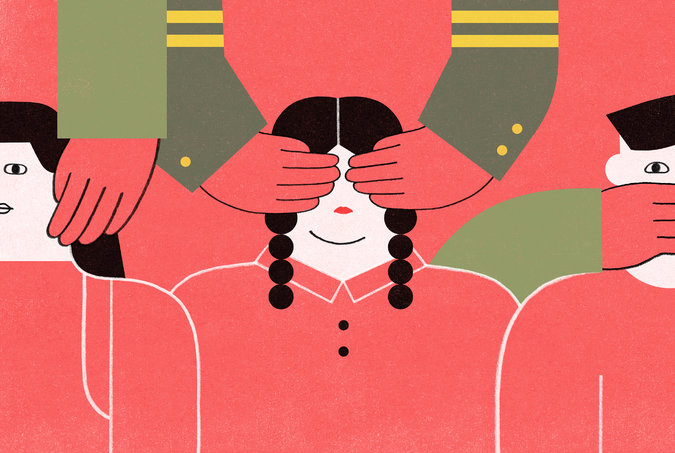At The New York Times, Chris Buckley reports on an online letter written by a Xinhua employee denouncing China’s increasingly tight media controls, which according to the widely shared (and quickly deleted) post “has triggered tremendous fear and outrage among the public, [who have began to] worry about another Cultural Revolution.” Xi Jinping has done much to strengthen government control over the media. Last month, he paid a visit to leading state media outlets to stress that news must “speak for the Party.” After the president’s Media tour, outspoken Internet commentator and retired property tycoon Ren Zhiqiang found himself banished from social media for suggesting that media should first serve the people who fund it.
“Under the crude rule of the Internet control authorities, online expression has been massively suppressed, and the public’s freedom of expression has been violated to an extreme degree,” said the letter, which spread quickly online in China and was taken down just as swiftly.
[…] The letter was issued in the name of Zhou Fang, who gave his work address as Xinhua News Agency headquarters in Beijing, and included his cellphone number and identity card number. A man who answered the phone at that number said that he was Mr. Zhou, an employee of Xinhua, and that he had written the letter.
“I don’t deny that,” he said. He said that he had been an editor at the news agency and that he now held an administrative job. “I can’t say anything more, because you’re foreign media,” he said.
[…] The new letter criticized the denunciations of Mr. Ren [Zhiqiang] on party-run websites, which called him a traitor and a subversive for taking issue with Mr. Xi’s demand that state-run media unfailingly obey the party.
[…] “The recent Internet security incident of ‘surrounding and attacking Ren Zhiqiang’ in a kind of Cultural Revolution-style mass criticism brought the delinquency of responsibilities and abuses of power by the Internet authorities to an extreme,” said the letter, which was dated Monday but spread widely only on Friday. […] [Source]
The Xi administration has also overseen an increasing intolerance of dissenting viewpoints expressed in Party dialogue, a trend that drew an unexpected call from state-run Global Times editor Hu Xijin for the encouragement of constructive criticism and more tolerance of unconstructive criticism. Amid the tightening of ideological control in the Party, an air of tension was noted hanging over the recent top political meetings in Beijing. Last week, independent financial media company Caixin Media drew attention to the censorship of an article quoting a delegate on the need for unrestrained commentary by posting an English-language article on the deletion (that article too was quickly and unsurprisingly deleted). At The Guardian, Emma Graham-Harrison and Tom Phillips profile Caixin founding editor Hu Shuli, a media professional known for her canny ability to skirt the line of sensitivity, focusing on her unique position in Xi’s China:
Editor Hu Shuli has spent decades nurturing her connections to China’s elite, able to read opaque political currents, a gift to go right up to the government’s red line and push it but “never cross it”, with two incarnations of a powerful financial news magazine.
So when she defied a climate of tightening government controls to publish the dramatic warning about official censorship, it sent shock waves across a China increasingly cowed by controls on media, activists and any organisations beyond the sphere of direct Communist party control.
[…] The crackdown [on civil society activism and the media] has gathered pace as worries about China’s economy accumulate, timing that many analysts say is no coincidence. Xi is battening down the hatches because he fears opponents created by his drive for power see the coming economic storm as a chance to hobble or undermine him.
[…] It is perhaps no coincidence that a financial magazine with a track record of political survival has decided to take on the government now, when opposition may be cowed but multiplying. […] [Source]
Read more on how official anxiety over China’s faltering economy may be a major motive in the state’s increasing control over the media from CDT Editor-in-Chief Xiao Qiang, via China File.







